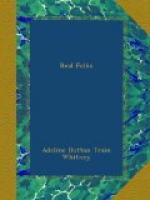“I remain, yours truly,
“TITUS OLDWAYS.”
“Luclarion!” cried Mrs. Ripwinkley, with excitement, “come here and help me think!”
“Only four days to make my mind up in,” she said again, when Luclarion had read the letter through.
Luclarion folded it and gave it back.
“It won’t take God four days to think,” she answered quietly; “and you can ask Him in four minutes. You and I can talk afterwards.” And Luclarion got up and went away a second time into the kitchen.
That night, after Diana and Hazel were gone to bed, their mother and Luclarion Grapp had some last words about it, sitting by the white-scoured kitchen table, where Luclarion had just done mixing bread and covered it away for rising. Mrs. Ripwinkley was apt to come out and talk things over at this time of the kneading. She could get more from Luclarion then than at any other opportunity. Perhaps that was because Miss Grapp could not walk off from the bread-trough; or it might be that there was some sympathy between the mixing of her flour and yeast into a sweet and lively perfection, and the bringing of her mental leaven wholesomely to bear.
“It looks as if it were meant, Luclarion,” said Mrs. Ripwinkley, at last. “And just think what it will be for the children.”
“I guess it’s meant fast enough,” replied Luclarion. “But as for what it will be for the children,—why, that’s according to what you all make of it. And that’s the stump.”
Luclarion Grapp was fifty-four years old; but her views of life were precisely the same that they had been at twenty-eight.
VI.
AND.
There is a piece of Z——, just over the river, that they call “And.”
It began among the school-girls; Barbara Holabird had christened it, with the shrewdness and mischief of fourteen years old. She said the “and-so-forths” lived there.
It was a little supplementary neighborhood; an after-growth, coming up with the railroad improvements, when they got a freight station established on that side for the East Z—— mills. “After Z——, what should it be but ‘And?’” Barbara Holabird wanted to know. The people who lived there called it East Square; but what difference did that make?




